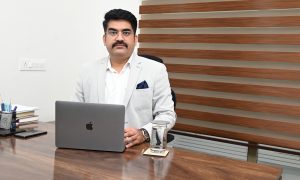Devashish Poddar- Senior Associate at Price Waterhouse & Co LLP working in the field of ‘Direct Taxation and other allied laws’

This interview has been published by Tanmaya Sharma. The Interview was taken by The SuperLawyer Team.
Working globally can prove to be challenging. Have you ever worked on a case that kept you in office long after the “office hours”? How did you handle the situation?
Indeed, working globally proves to be challenging. But it comes with its pros and cons. As Lord Robertson once quoted, Globalisation will make our societies more creative and prosperous, but also more vulnerable. Working globally opens doors to a larger set of stakeholders which at times can become overwhelming.
Yes, due to confidentiality requirements, there are times when we have to spend time beyond our office hours. The entire scenario becomes challenging and complex. However, finding a passion and zeal for the work helps me stay motivated and onboard. I realize that the moment I start spending more time with my work, I find creative and innovative ways to handle a particular situation. In turn, I begin to enjoy my work.
You have crafted a niche for yourself in your area of expertise, i.e. Corporate and International taxation and regulatory services. At what point in your education curve did you realize you want to devote your career to this particular field? Besides your current speciality in law, what other specialities pique your interest? Do you have experience in those areas?
I belong to a family of diversity. My grand-uncle is an economist and a tax professional. My father completed his LL.B. but was unable to pursue his career in law. My siblings, being chartered accountants/advocates, have been engaged in the field of tax for over a decade now. Being brought up in such an atmosphere always prompted me to take up ‘tax’ as my career. So to answer your question, it was during my preparations for final exams, I ensconced my thoughts to take up tax as a path ahead.
Since many facets of tax are dependent on civil/criminal laws, others related to corporate laws and the Constitution of India, reading the same, intrigues my thoughts to come up with better, innovative and lawful solutions for my clients. Besides the same, in recent times, I have developed some interest in the field of Environmental, Social, and corporate Governance (ESG). The 2021 United Nations Climate Change Conference – COP26 held in Glasgow attended by the Indian Prime Minister Shri Narendra Modi enticed my interests in this area wherein the stakeholders are re-aligning their business strategy with environmental concerns to achieve sustainable development. Also, tax technology is another area of my interest.
I was a part of the team which tested a newly-developed tax litigation tool in one of my previous organizations. In addition to the aforesaid, since every provision of law should sync with the intent of the Constitution of India, I have been a part of some assignments wherein I had multiple opportunities to explore the provisions of the Constitution of India related to the taxation statutes.
You’ve previously worked in one of India’s leading law firms. What do you think is the main difference in work culture between L&L Partners, New Delhi (Luthra & Luthra Law Offices) and PWC?
I believe most organizations turn out to be similar, only if a professional wants to work, learn, earn and grow. The same analogy applies to an Indian law firm and a global accounting firm. Indian law firms may not function under a global mandate, however, the trend of following ‘global best practices’ and developing a pool of stakeholders from different countries have made the law firms function in a manner that is not much different from a multinational enterprise. The work is similar, the clientele is similar, and again even the stakeholders and management function in a similar manner.
However, the only difference is that while working with a multinational professional services network of firms, a person gets more opportunities to interact with peers and connections within the firm (both in India as well globally). A person can leverage the worldwide network of a global accounting firm to find more lucrative opportunities. Although the Indian law firms establish relationships with international law firms, the aforesaid difference is also fading away. On the other hand, Indian law firms provide you with ample opportunities to interact and communicate with some of the country’s top practitioners.
Can you tell us briefly about the various global groups that you’ve assisted to set up their offices in India? What kind of work goes into setting up an office in a different country?
I have been a part of a team that assisted a global railway company set up its office in India. In addition, I had opportunities to assist-
- British multinational telecommunications company
- American multinational conglomerate company (world’s largest telecommunications company)
- Canadian telecommunications and data networking equipment manufacturer
- German automotive Manufacturing Corporation
- Malaysian Oil and Gas Company
- Private equity firms
- International investment management firms
- Massachusetts-based life insurance Company
- And a few others.
To set up an office (especially in India), the group should first decide about the form and structure of the entity. Since the efficiency of the presence in a country and the applicable laws flow from the type of entity being set up. Thereafter, if it is a company, then corporate laws applicable for registration and set-up are required to be adhered to. Similarly, if applicable, the entity in India is required to comply with RBI and SEBI laws. In addition, tax registrations (PAN, TAN, GSTIN, IEC, etc.) may also be required. If the entity decides to onboard employees, then employment laws and registration requirements may also warrant attention.
You are a corporate tax lawyer, usually dealing with transactions, compliance and advisory, but you have hands-on experience in litigation and have dealt with some high-profile cases as well. Can you please share with our audience which part of your legal journey you enjoyed the most?
Being a CA as well as a lawyer, helped me experience the best of both worlds. While advisory and compliances have their own set of perks, litigation is an area wherein my mind becomes more creative. I believe I can enjoy and learn more while being engaged in a litigation project. The time spent on articulating thoughts and drafting a document to present one’s case in a simple, precise and crisp manner is satisfying. Representing a client before the court of law and achieving success is bliss.

Finance Minister Nirmala Sitharaman introduced The Taxation Laws (Amendment) Bill, 2021 in the Lok Sabha recently, which seeks to withdraw tax demands made on indirect transfer of Indian assets before May 28, 2012, what major changes (if any) will be seen because of this?
The Taxation Laws (Amendment) Act, 2021 (TLA) amended the Finance Act, 2012. Earlier, due to the retrospective amendments vide the Finance Act, 2012, tax implications arose on a few of the largest Indian companies. Thereafter, there was decade-long litigation between the companies and the Government of India. Numerous international courts/arbitration forums were explored and approached by the companies aggrieved by the provisions of the Finance Act 2012. Therefore, to avoid such protracted litigation and dispute, the Government of India decided to settle the issue by giving a limited window to such aggrieved companies for settling the disputes forever.
Such a move by the Government of India and the legislatures is a welcome move. The aforesaid would aid the companies to buy peace and seek the refund of taxes already deposited by them under protest. By introducing TLA, India is on its path to attracting foreign investments for the ‘Make in India’ campaign and in return fulfilling its objective of atma nirbhar Bharat, i.e. self-reliant India. The introduction of TLA has reposed the faith of big corporate houses in the Government of India. Multinational enterprises are now aware that the Indian Government and legislatures are well cognizant of the issues around the country and prompt laws are made to fulfil the objective of India as a welfare state.
How do you see the Indian tax laws in the future?
Laws are efficient only if they curb the menace. A complex and ambiguous set of provisions often defeat the legislative intent. India has tried to simplify the indirect tax regime by introducing the GST laws which have replaced numerous other statutes to form a single consolidated law for various indirect taxes in India. Similarly, I believe India may witness a change in its direct tax laws as well, wherein various deductions and exemptions can be done away with and a lower rate of taxation may be introduced to benefit the companies as well as individuals. Various ‘conditional’ deductions and exemptions provided in the direct tax laws may prove to be beneficial for professionals who are aware of the benefits provided by the law, but at the same time makes it difficult for the public in general to interpret the same. Due to the aforesaid, the legislature and the Government of India have already introduced a few provisions which provide for a low rate of tax while disallowing most of the deductions and exemptions. We may witness such similar changes in the future as well.
What suggestions would you like to offer to our young lawyers, law students and law graduates?
I always resonate with the quote, “There is no shortcut to success”. Hard work has no replacement, especially in our country and in the field of law. However, we must all realise that the era demands not just hard work but smart work as well. We do not live long enough to spend a substantial portion of our life in the office or at work. We all need a work-life balance. And, there comes the smart work. A professional who works hard and at the same time smartly saves time, achieves desired results, adds value to the clients and also invests time in personal life and well-being. Even luck favours those who work hard and smartly at the same time.
To sum up, I would quote the former president of the United States, Thomas Jefferson
“I am a great believer in luck, and I find the harder I work, the more I have of it.”
Get in touch with:

























